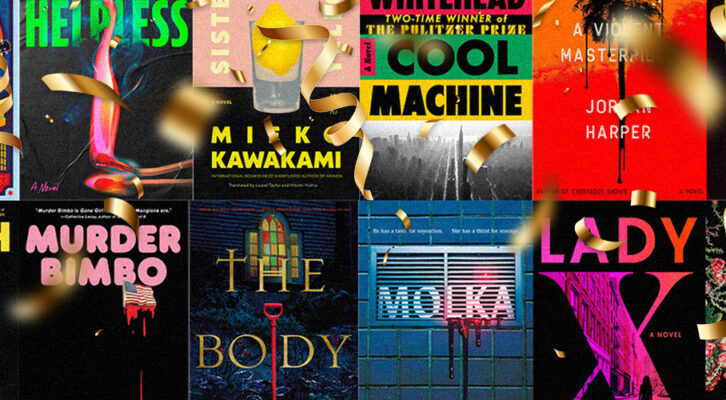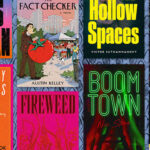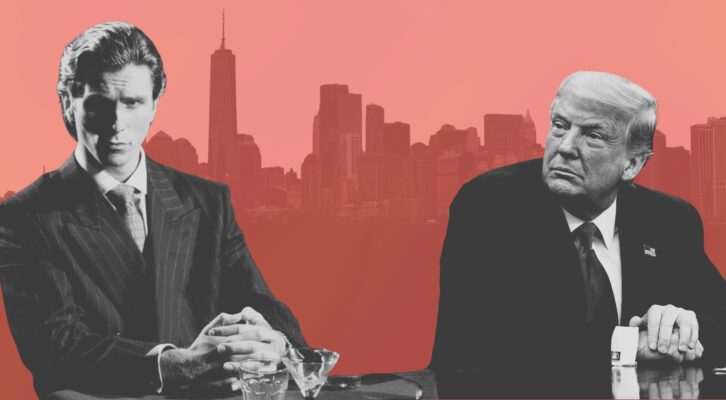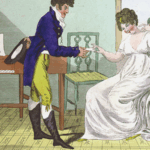My father was a doctor—an ER physician at Falmouth Hospital, to be specific—but that’s not why our dinner conversations often revolved around ways to save people, or how to kill them. His side gig during my youth was as a novelist, and it was his job to inflict terrible harm against the characters he made his readers love or despise.
Even though my dad had a unique job, he also had the very non-unique challenge of trying to connect with his two sons—me and my older brother Matthew, a career diplomat and author of four political thrillers. While the width of our generation gap wasn’t the chasm my grandparents had to cross to reach their kids in the 1960s, we still cared about things (see: Atari, Rubik’s cube, Dungeons and Dragons, The A-Team) that didn’t exactly resonate with my father. Perhaps his quest to find common ground inspired him to expose us to stories that were arguably a wee bit too mature for our young minds to process.
Long before the term “binge” entered the vernacular, my father would gorge on conspiracy stories, a trope that served as the foundation for many of his novels. The tumultuous 1970s was a fertile time for conspiracy tales, thanks in large part to Watergate and a growing distrust of government, coupled with diminished US credibility abroad. (Hmmm, sound familiar?) Whatever our father’s rationale for exposing us to humanity’s dark underbelly at such an early age, my brother and I developed a deep appreciation for the conspiracy novel, one that has shaped our sense of story in a way similar to its influence on our father’s writing more than three decades ago.
I’d like to present some paranoid conspiracy thriller novels of the 1970s that provided hours of arguably age-inappropriate dinner conversation at my house, bridged a generation gap, and helped shaped my storytelling sensibilities decades later.
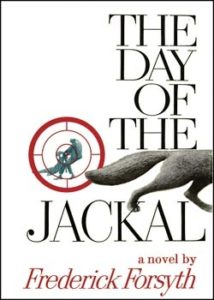
Frederick Forsyth, The Day of the Jackal
Frederick Forsyth’s depiction of a professional assassin, contracted by a French dissident paramilitary organization to kill Charles de Gaulle, the President of France, renders such an accurate portrayal of a global manhunt that it was no surprise when the author later revealed his past role as a British M16 agent. Perhaps that’s why he was able to write the book in 35 days, which is utterly discouraging for us mere mortal writers. When it comes to grand conspiracies, nothing satisfies quite like a high-level assassination. The Jackal’s cunning makes him compellingly enigmatic and oddly sympathetic. The Day Of the Jackal is arguably the best conspiracy thriller ever written, and inarguably had a profound impact on the genre of political/conspiracy thrillers.
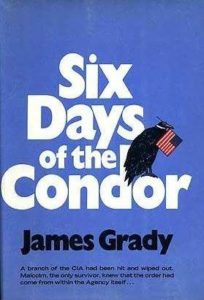
James Grady, Six Days Of the Condor
My father often quipped that James Grady’s masterwork became Three Days of the Condor because Hollywood always pared down plots. But Condor remained, in film and book form, one of my father’s all-time favorite stories. A hallmark of my father’s writing involved protagonists drawn into the story because of something they do professionally. He seldom wrote detectives out to solve mysteries. His characters are pulled into the story against their wills and forced to overcome insurmountable odds to defeat the forces working to destroy their lives. Six Days of the Condor employs a similar storytelling approach. In the story, a CIA operative whose job it is to read books may, or may not, have read the wrong thing. The Condor leaves for coffee at a fortuitous time when all of his colleagues are brutally gunned down in a mass assassination. A life and death struggle ensues that will require this bookworm to become so much more if he hopes to survive.
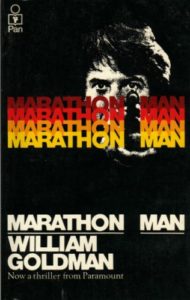
William Goldman, Marathon Man
William Goldman’s 1974 classic is another of my father’s favorite conspiracy novels, and quite possibly his favorite book ever. For the same reasons he loved Condor, Marathon Man thrusts an ordinary person—in this case, Thomas Babington “Tom” Levy, a postgraduate student in history and aspiring marathon runner—into a life-death struggle against a ruthless adversary. The story centers on a former Nazi SS dentist at Auschwitz, Dr. Christian Szell, who provides information about other escaped Nazis to a shadowy US agency called “The Division,” in exchange for access to ill-gotten diamonds stolen from his prisoners. The narrative is endlessly propulsive, but if the chapter titled “Pulp” doesn’t make you squirm in your chair, please check your pulse.
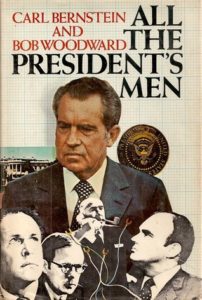
Woodward and Bernstein, All the President’s Men
These days pundits and non-pundits alike are comparing Trump’s White House to Nixon’s. For historical context in vetting that theory, one need look no further than Bernstein and Woodward’s explosive book, All The President’s Men, which many herald as the most significant political detective story ever told. The difference between conspiracy fiction and actual political conspiracies is that often the cover-up, as was the case with Watergate, tends to be worse than the purported crime.
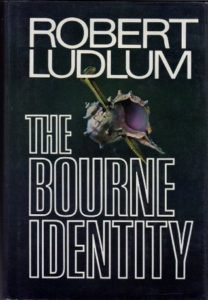
Robert Ludlum, The Bourne Identity
A man rescued by a passing fishing boat with no memory but remarkable skills sets up the stunning novel by Robert Ludlum, which was so dog-eared in my father’s library as to render the book nearly unreadable. My dad so admired Ludlum that when he had to outline a book, he “stole” the form he used from Ludlum’s novel The Chancellor Manuscript. While The Bourne Identity was published in 1980, the influence of 1970s conspiracy culture is undeniable. It’s for this reason Bourne remains iconic in Ludlum’s remarkable oeuvre, as it fulfills the promise of every good conspiracy story: secret organizations in the government are pulling strings from the shadows. Which means anyone, even me, could be a covert operative.
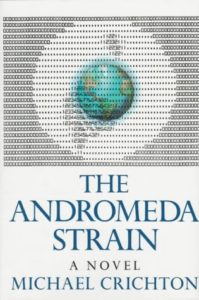
Michael Crichton, The Andromeda Strain
Another addition to conspiracy novels of the 1970s that doesn’t exactly fall within the decade is Crichton’s masterwork in genre-bending suspense, The Andromeda Strain. First published in 1969, The Andromeda Strain involves the hunt for upper-atmosphere microbes for conversion into bioweapons. Instead of a weaponized germ, what these scientists bring back from outer space causes instantaneous lethal blood clotting that wipes out an entire town. Peppered with mistrust, fear, and paranoia, The Andromeda Strain cooks up an ideal recipe for a good conspiracy story. The novel depicts a government that is willing to go to the far reaches of space to get their hands on weapons of mass destruction, and is equally adept at covering up their mistakes. Written in a way that reads like non-fiction, The Andromeda Strain may have been a treatise of the Cold War that had intensified in the 1960s, but it was also a harbinger for government conspiracy stories of the decade that followed.
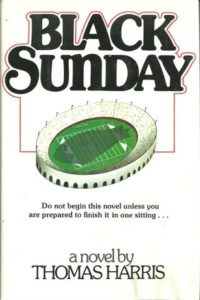
Thomas Harris, Black Sunday
The 1975 novel by Thomas Harris (yes, the same Thomas Harris who gave us Hannibal Lecter) deals with a pact between Michael Lander, a pilot who flies the Aldrich Blimp over NFL football games, and Black September, the terrorist organization responsible for the massacre of Israeli athletes at the 1972 Munich Olympics. Lander, a former POW from the Vietnam War, is deranged and angry at all the happy football fans he helps film from high above, which is why he’s willing to kill himself and take as many people as possible with him in the process. Like The Day of the Jackal, the book is a hunt as American and Israeli intelligence forces track the path of explosives into the country that will eventually lead them to a blimp bomb made of plastique and a quarter million steel darts. Harris makes the case that conspiracies don’t have to involve shadowy governments to be terrifying. He also portrays how war can do an equally good job of creating killers as any covert government operation. Black Sunday was the novel my father returned to on many occasions when he needed reminders of how to build suspense to a knuckle-whitening degree.



